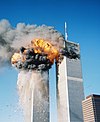| Part of a series on | |||||||
| Terrorism and political violence | |||||||
|---|---|---|---|---|---|---|---|
By ideology
|
|||||||
| Organizational structures | |||||||
|
|||||||
| Terrorist groups | |||||||
Relationship to states
|
|||||||
| Response to terrorism | |||||||
Environmental terrorism consists of one or more unlawful or even hostile actions that harm or destroy environmental resources or deprive others of their use. It is different to environmental vandalism, which is a rather permitted but ethically disputed destruction of environment.
Definition
There are academic and semantic difficulties in defining "terrorism" and specifically "environmental terrorism", but discussions of environmental terrorism are growing with a focus on identifying possible risks to natural resources or environmental features. Some, including in the military argue that attacks on natural resources can now cause more deaths, property damage, political chaos, and other adverse effects than in previous years.
Chalecki distinguishes between environmental terrorism and eco-terrorism. She notes that environmental terrorism can be defined "as the unlawful use of force against in situ environmental resources so as to deprive populations of their benefit(s) and/or destroy other property". In contrast, eco-terrorism is the destruction of property in the interest of saving the environment from human encroachment and destruction. More concisely, environmental terrorism involves targeting natural resources. Eco-terrorism involves targeting the built environment such as roads, buildings and trucks, in defense of natural resources. Other analysts may fail to distinguish between these different threats.
Examples
Incendiary balloons from the Gaza Strip were used to burn down approximately 2,260 acres of woodland in Israel during the first half of 2018.
Children of Fire Initiative, an organization believed to be an offshoot of the PKK, claimed responsibility for multiple arson and wildfire attacks in Turkey, including those that happened in 2020.
Illegal burnings of waste in the West Bank have been claimed to be acts of environmental terrorism against Israel as they are one of the main causes of carcinogenic air pollution in Israel.
See also
References
- Alpas, Hami (2011). Environmental Security and Ecoterrorism. Springer. p. 16. ISBN 9789400712379.
- "Health groups call for global fossil fuel non-proliferation treaty". the Guardian. 14 September 2022. Retrieved 8 October 2022.
- Chalecki, Elizabeth (September 2001). "A New Vigilance: Identifying and Reducing the Risks of Environmental Terrorism" (PDF). Pacific Institute. Archived from the original (PDF) on 2007-07-13.
- Butts, K.H.; Turner, C. W.; Jasparr, C. (September 2003). "Environmental Security Cooperation" (PDF). Center for Strategic Leadership, U.S. Army War College, Carlisle, Pennsylvania. Archived from the original (PDF) on 2007-06-26.
- San Francisco Chronicle, July 1, 2001, page A10
- Doug Weir, "Israeli protected areas seem doomed to be the latest environmental victim of the ongoing conflict", Conflict and Environment Observatory, July 11, 2018
- Yilmaz, Dr Kamil (15 December 2020). "Claiming and Glorifying Environmental Terrorism Online: The Case of PKK's 'Children of Fire Initiative'". GNET. Retrieved 2021-08-02.
- "זיהום אוויר בשפלה בשל שריפת פסולת באתרים פירטיים בשטחי הרשות | כלכליסט". calcalist (in Hebrew). 2023-11-08. Retrieved 2023-11-21.
- "Palestinian waste fires are 'killing us slowly,' warn West Bank Israelis". The Jerusalem Post | JPost.com. 2023-02-21. Retrieved 2023-11-21.
Further reading
- Baechler, G. 1999. “Environmental Degradation and Violent Conflict: Hypotheses, Research Agendas, and Theory-building.” In Ecology, politics, and violent conflict, edited by Mohamed Suliman, 76–112. London: Zed Books.
- The Gilmore Commission. 2000. “Second Annual Report to the President and the Congress of the Advisory Panel to Assess Domestic Response Capabilities for Terrorism Involving Weapons of Mass Destruction. II. Toward a National Strategy for Combating Terrorism.” Santa Monica, CA: RAND, 15 December 2000.
- Gleick, P.H. 1993. "Water and conflict." International Security Vol. 18, No. 1, pp. 79–112 (Summer 1993).
- Gleick, P.H. 1998. The World's Water 1998-1999: The Biennial Report on Freshwater Resources. Covelo, CA: Island Press.
- Lietzmann, K.M. and G.D. Vest. 1999. Environment & Security in an International Context. Committee on the Challenges of Modern Society - Final Report, March 1999. Report No. 232. North Atlantic Treaty Organization. 174 pp.
- Schwartz, D.M. 1998. “Environmental Terrorism: Analyzing the Concept” Journal of Peace Research. Vol. 35, No. 4, July 1998, pp. 483–496.
| Terrorism | ||
|---|---|---|
| Main articles |  | |
| By ideology | ||
| Types and tactics | ||
| State involvement | ||
| Organisation | ||
| Historical | ||
| Lists | ||
| Memorials and museums | ||
| By country | ||